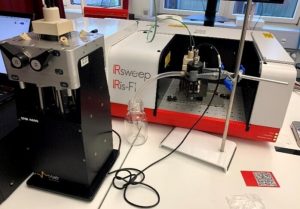 Protein chemists have always wanted to follow kinetics in the mid infra-red region (mid-IR) in order to better understand protein folding, and to obtain information about secondary structure changes involved in the folding process. Traditionally, the stopped-flow is coupled to a Fourier Transform Infra-Red (FT-IR) spectrometer. The main limitation of such set-ups for rapid kinetics is the FT-IR spectrometer’s time resolution, as the fastest usable acquisition speed is often in the 30-50 ms range. In practical terms, this means that there is a disparity between the capability of the spectrometer and the dead time of the stopped-flow – a disparity which can limit research potential.
Protein chemists have always wanted to follow kinetics in the mid infra-red region (mid-IR) in order to better understand protein folding, and to obtain information about secondary structure changes involved in the folding process. Traditionally, the stopped-flow is coupled to a Fourier Transform Infra-Red (FT-IR) spectrometer. The main limitation of such set-ups for rapid kinetics is the FT-IR spectrometer’s time resolution, as the fastest usable acquisition speed is often in the 30-50 ms range. In practical terms, this means that there is a disparity between the capability of the spectrometer and the dead time of the stopped-flow – a disparity which can limit research potential.
The IRis-F1 spectrometer from IRsweep is a dual comb spectrometer especially designed for rapid kinetics measurements which overcomes the limitations of FT-IR with regards to speed and resolution. By coupling the IRsweep to a BioLogic SFM stopped-flow (a simple process), users can now observe sub-10 ms biochemical reaction kinetics in the mid-IR region that would have previously been impossible, opening up important research opportunities.
The aim of this webinar is to demonstrate how the BioLogic SFM4000 can be easily connected to the IRsweep’s IRis-F1 to follow reactions in the millisecond time scale, and to observe never-before-seen mid-IR reactions.
The fast transition from β-sheet to α-helix in β-lactoglobulin secondary structure has been described by Gerwert et al. using trifluoroethanol as a denaturant agent. This fast reaction is used to demonstrate the performance of the coupled SFM-4000 and IRis-F1.
10 June 2021 – 6:00 pm CET
Speakers

Florian Eigenmann
Florian Eigenmann holds a Ph.D. in chemical engineering from ETH Zurich and joined IRsweep in 2018 as Business Development Manager. He was instrumental in releasing the high spectral resolution version of the IRis-F1 and in developing reaction monitoring applications including stopped flow and curing monitoring. The first commercially available dual-comb spectrometer IRis-F1 has led to a paradigm change in time resolved vibrational spectroscopy (TRVS). Now microsecond reaction monitoring becomes possible in the mid-IR for non-cyclic reactions which was only applicable with RapidScan FTIR with limited time resolution. Furthermore, IRsweep is developing other applications such as vibrational dichroism spectroscopy (VCD) or protein dynamics where IRis-F1 is already validated with StepScan FTIR. Previously, Florian was with Bruker Optics and Mettler Toledo for a total of 12 years in Country Manager and Business Development positions for mid and near-IR applications with a focus on in situ spectroscopy and process analytics.

Cédric Georges
Cédric graduated in Analytical Chemistry from both University de Montpellier (France) and University of Swansea (Wales). After some research experience at Rhone Poulenc Rorer, Cédric served in a French military research center as an enzymologist. Cédric joined BioLogic in 2000 where he started as application scientist before taking responsibilities in global sales and Product Management. Cédric is now Product Manager for all rapid kinetics and Spectroscopy instrumentation. Cédric lead the development of the last generation of stopped-flow mixers (SFM-4000 series) and has been involved in the external couplings such as the Stopped-flow DCS coupling described today. BioLogic develops rapid kinetics instrumentation since 1983 from its headquarter in Grenoble (France) and is a leader in stopped-flow spectroscopy but also in electrochemistry and battery testing instrumentation. BioLogic now has around 130 employees based in France and in its different affiliates office.
